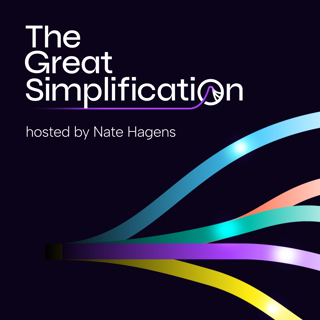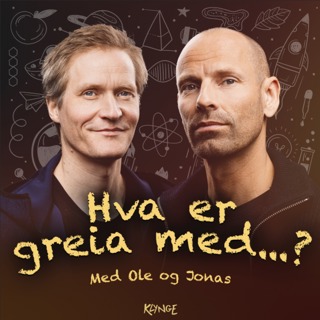
7 Meta Questions About Our Global Metabolism | Frankly #59
Recorded April 4 2024 Description Based on this week's podcast episode with Geoffrey West, which covered how biological scaling applies to human economies, this week's Frankly is a reflection on what this might mean for the future of our societies. Throughout history and up to today, there are scaling patterns driving our social and infrastructural metabolism - potentially shedding light on some long debated questions about the limits of our ability to design our societies. Do we as humans have the agency to create different paths towards less resource consumption, or are we trapped within a previously hidden law of nature? Will the resource and waste limitations of our biosphere force us to live differently, regardless of our choices? More hopefully, can understanding we have a metabolism change our metabolism, and steer futures away from the current default? Watch on Youtube: https://www.youtube.com/watch?v=7qb-9CMM6Ac For Show Notes and More: https://www.thegreatsimplification.com/frankly-original/59-7-meta-questions-about-our-global-metabolism
4 Apr 202415min

Geoffrey West: "Metabolism and the Hidden Laws of Biology"
On this episode, physicist Geoffrey West joins Nate to discuss his decades of work on metabolic scaling laws found in nature and how they apply to humans and our economies. As we think about the past and future of societies, there are patterns that emerge independently across cultures in terms of resource use and social phenomena as the size of a city grows. Does Kleiber's law, which describes the increasingly efficient use of energy as an animal gets larger - also apply to human cities? How have humans deviated from this rule through excess social consumption beyond a human body's individual metabolic needs? What could we learn from these scaling laws to adjust our communities to be more aligned with the biophysical realities of energy and resource consumption? Can an understanding of social metabolism impact our social metabolism? About Geoffrey West Geoffrey West is the Shannan Distinguished Professor and former President of the Santa Fe Institute and an Associate Senior Fellow of Oxford University's Green-Templeton College. West is a theoretical physicist whose primary interests have been in fundamental questions ranging across physics, biology and the social sciences. His work is motivated by the search for unifying principles and the "simplicity underlying complexity". His research includes metabolism, growth, aging & death, sleep, cancer, ecosystems, innovation and the accelerating pace of life. Most recently he has been developing a science of cities and companies, including the challenge of long-term global sustainability of the anthroposphere. He is the author of the best-selling book Scale; The Universal Laws of Growth, Innovation, Sustainability, and the Pace of Life in Organisms, Cities, Economies, and Companies. Find out more, and show notes: https://www.thegreatsimplification.com/episode/117-geoffrey-west Watch on YouTube: https://youtu.be/my9a9Ftr7ek
3 Apr 20241h 41min

The Fellowship of the Ring - 'Bend Not Break' Version | Frankly 58
In this Frankly, Nate recasts his favorite book series, the Hobbit and the Lord of the Rings by JRR Tolkien, with some speculative "archetypes" of our human world grouped by various timelines. The eventual reduction in energy and material accessibility will likely alter the archetypes that we're familiar with today - perhaps to become something not helpful to larger society. What categories of human archetypes in the future will have the potential to best influence their communities and the Earth? What will the most powerful among us choose when it comes to protecting their (monetary, temporary) wealth vs using it towards prosocial collective responses? Finally, and most importantly what archetypes will form a new Fellowship of humans to 'bring the ring to Mordor' during humanity's 'Bend not Break' moment? Which archetype do you resonate with? Are there others? Watch on Youtube here: https://www.youtube.com/watch?v=3oh-zdo-l8I For Show Notes and More: https://www.thegreatsimplification.com/frankly-original/58-the-fellowship-of-the-ring-bend-not-break-version
29 Mar 202423min

Riane Eisler: "Domination and Partnership in Society"
On this episode, Nate is joined by systems scientist Riane Eisler to discuss her decades of work studying 'domination' and 'partnership' societies throughout history and what it might mean to transition to more sustainable societies in the future. What we value at the individual and family level directly translates to the way we frame our governance systems - societies that emphasize empathy and caring also implement the same types of policies and values. How could we foster the more cooperative side of our humanity across all scales to create empowered communities and balanced decision making? What societies - past and present - lean towards a partnership paradigm and what benefits do their people receive? Is it possible to move away from violence and control oriented systems and into ones that value wide boundaries of empathy and understand the vital nature of care work? About Riane Eisler Riane Eisler is the President of the Center for Partnership Systems, which provides practical applications of her work, and Editor in Chief of the online Interdisciplinary Journal of Partnership Studies published at the University of Minnesota. Eisler's innovative whole-systems research offers new perspectives and practical tools for constructing a less violent, more egalitarian, gender-balanced, and sustainable future. She is author of many books, including The Chalice and the Blade, now in its 57th US printing and 27 foreign editions, The Real Wealth of Nations, and Nurturing Our Humanity co-authored with Douglas P. Fry. For more information, see www.rianeeisler.com and www.centerforpartnership.org. Find out more, and show notes: https://www.thegreatsimplification.com/episode/116-riane-eisler Watch on YouTube: https://youtu.be/UUF5XWOxVdY
27 Mar 20241h 9min

Information Bifurcation | Frankly #57
Recorded March 19 2024 Description In this Frankly, Nate reflects on ten dichotomies that he sees prevalent in our current culture of information consumption and media. We are increasingly bombarded with news from traditional media outlets as well as emerging smaller platforms. Yet interpreting these inputs depends on the individual and societal lenses we use, alongside the presentation of and quality of the information itself. Further, how are academic and scientific sources of information becoming increasingly gatekept - accessible to only those who can pay? What should individuals keep in mind as we navigate biases and underlying intentions surrounding journalism and educational content? Are we able to set aside our internalized perspectives of the world and listen to what is being said - rather than leaning into what our identities want us to hear? To Watch on Youtube: https://youtu.be/ZRQ3g36ZtWo For Show Notes and More: https://www.thegreatsimplification.com/frankly-original/57-information-bifurcation
22 Mar 202415min

Patrick Knodel: "Question Everything - Towards Cooperation & Change"
On this episode, Nate is joined by impact investor Patrick Knodel to discuss how philanthropy and non-profit work might make positive change beyond the superficial level. The power of understanding the values and lived realities of other cultures is often overlooked but is central to finding meaningful interventions and support. Through connecting with people across the globe, Patrick has a deep sense of how to create projects that span beyond single issues, and support the autonomy of communities while preserving the land they inhabit. What does it mean to be constantly learning and questioning what you think you know - and why is it important? Is it possible to change the system from within, shifting away from growth and power paradigms perpetuated by our current institutions? How can we develop worldviews that transcend mainstream narratives and work towards true awareness of the big picture around us? About Patrick Knodel Patrick Knodel is the CEO of the knodel foundation, an impact investing firm which focuses on projects that increase sustainability and autonomy for the Global South. He also directs the investments for purpose driven and impactful startups through PANDION INNOVATION for IMPACT GmbH. Patrick has a background in economics and entrepreneurship, but his worldview and drive for non-profit projects has been shaped through his travels. Through all of his work he listens, learns, and tries to influence people with regards to issues around wealth, war, and humanity. Watch on YouTube: https://youtu.be/YU60Kn88b6c More details, and show notes: www.thegreatsimplification.com/episode/115-patrick-knodel
20 Mar 20241h 33min

Chuck Watson: "NATO in Ukraine: from Proxy to Participants"
On this special episode, risk analyst Chuck Watson returns to discuss the current state of the conflict in Ukraine and the potential for escalation. With the conflict centered around resource control, cultural clashes, and political posturing - will European countries now push to keep the United States involved with the conflict? More, are we seeing the full picture from the perspective of western media? Who is really winning this 'open secret war' and what is the context behind the various realities of the players in this conflict? Are there still peaceful, stable options that maneuver us away from open war and what would those mean for the rest of the world? About Chuck Watson Chuck Watson has had a long career in military and intelligence work, with a specialty in natural and human made disaster modeling. He worked for the US Air Force, was an attache to US Ambassadors to the Middle East Robert McFarland, and Secretary of Defense Donald Rumsfeld as a Soviet expert. Chuck has worked as an advisor to the military for over four decades with a particular emphasis on big data, open source intelligence, with an emphasis on the Soviet Union and Russia. Chuck is also the founder and Director of Research and Development of Enki Holdings, LLC, which designs computer models for phenomena ranging from tropical cyclones (hurricanes) and other weather phenomena, earthquakes, and tsunamis, as well as anthropogenic hazards such as industrial accidents, terrorism, and weapons of mass destruction. Watch on YouTube: https://youtu.be/0CeoLYQGUF0 More details, and show notes: www.thegreatsimplification.com/episode/114-chuck-watson
15 Mar 202456min

Lyn Alden: "The Myth of Frictionless Finance"
On this episode, Nate is joined by investment strategist Lyn Alden to discuss how energy and technology have shaped our monetary system and current financial trends. While more people are becoming aware of energy's foundational role in our global systems, it is still widely overlooked, especially among those working in finance. In contrast, Lyn's biophysically rooted analysis of macroeconomic patterns expose the cyclical dysfunction of the world's economy. How has increasing energy availability and productivity offset the inflationary nature of fiat currencies - and what happens if this trend were to slow or reverse? What assumptions and biases have led most analysts to mis-read long term trends, leaving us with vulnerable economies? Is it possible to rejigger our systems and innovate more biophysically aligned tools to enable a smoother transition into a future with a lower energy throughput? About Lyn Alden: Lyn Alden is an independent analyst and founder of Lyn Alden Investment Strategy with a background in engineering management. Her work provides institutional-level research in plain English, so that both institutional investors and retail investors can benefit from it. Lyn also serves as an independent director on the board of Swan.com and as a general partner at the venture capital firm Ego Death Capital. She is the author of the 2023 best-selling book Broken Money about the past, present, and future of money through the lens of technology. Lyn has a bachelor's degree in electrical engineering and a master's degree in engineering management, with a focus on engineering economics, systems engineering, and financial modeling. She worked for over a decade as an electrical engineer at the Federal Aviation Administration's William J. Hughes Technical Center. For Show Notes and More visit: thegreatsimplification.com/113-lyn-alden To watch this video episode on Youtube → https://youtu.be/JTbZaSL1pHI
13 Mar 20241h 40min




















